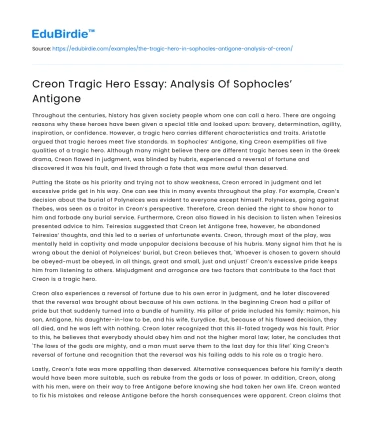Throughout the centuries, history has given society people whom one can call a hero. There are ongoing reasons why these heroes have been given a special title and looked upon: bravery, determination, agility, inspiration, or confidence. However, a tragic hero carries different characteristics and traits. Aristotle argued that tragic heroes meet five standards. In Sophocles’ Antigone, King Creon exemplifies all five qualities of a tragic hero. Although many might believe there are different tragic heroes seen in the Greek drama, Creon flawed in judgment, was blinded by hubris, experienced a reversal of fortune and discovered it was his fault, and lived through a fate that was more awful than deserved.
Putting the State as his priority and trying not to show weakness, Creon errored in judgment and let excessive pride get in his way. One can see this in many events throughout the play. For example, Creon’s decision about the burial of Polyneices was evident to everyone except himself. Polyneices, going against Thebes, was seen as a traitor in Creon’s perspective. Therefore, Creon denied the right to show honor to him and forbade any burial service. Furthermore, Creon also flawed in his decision to listen when Teiresias presented advice to him. Teiresias suggested that Creon let Antigone free, however, he abandoned Teiresias’ thoughts, and this led to a series of unfortunate events. Creon, through most of the play, was mentally held in captivity and made unpopular decisions because of his hubris. Many signal him that he is wrong about the denial of Polyneices’ burial, but Creon believes that, 'Whoever is chosen to govern should be obeyed-must be obeyed, in all things, great and small, just and unjust!' Creon’s excessive pride keeps him from listening to others. Misjudgment and arrogance are two factors that contribute to the fact that Creon is a tragic hero.
Creon also experiences a reversal of fortune due to his own error in judgment, and he later discovered that the reversal was brought about because of his own actions. In the beginning Creon had a pillar of pride but that suddenly turned into a bundle of humility. His pillar of pride included his family: Haimon, his son, Antigone, his daughter-in-law to be, and his wife, Eurydice. But, because of his flawed decision, they all died, and he was left with nothing. Creon later recognized that this ill-fated tragedy was his fault. Prior to this, he believes that everybody should obey him and not the higher moral law; later, he concludes that 'The laws of the gods are mighty, and a man must serve them to the last day for this life!' King Creon’s reversal of fortune and recognition that the reversal was his failing adds to his role as a tragic hero.
Lastly, Creon’s fate was more appalling than deserved. Alternative consequences before his family’s death would have been more suitable, such as rebuke from the gods or loss of power. In addition, Creon, along with his men, were on their way to free Antigone before knowing she had taken her own life. Creon wanted to fix his mistakes and release Antigone before the harsh consequences were apparent. Creon claims that “Fate has brought all my pride to a thought of dust.” His fate has taken everything that was important to him just because of one known error. Now Creon believes that he has nothing; he must live with the guilt of killing his family and Antigone. King Creon’s devastating fate is the last piece of criteria for considering him to be a tragic hero.
In summation, Greek tragedy portrays a story of a tragic hero. In Antigone, Creon meet all five of Aristotle's criteria to be a tragic hero: his blindness in judgment, pride, fate, reversal of fortune and realization of the outcome that it was his fault. At the end of this Greek tragedy, once can clearly see that Creon is the tragic hero.






 Stuck on your essay?
Stuck on your essay?

